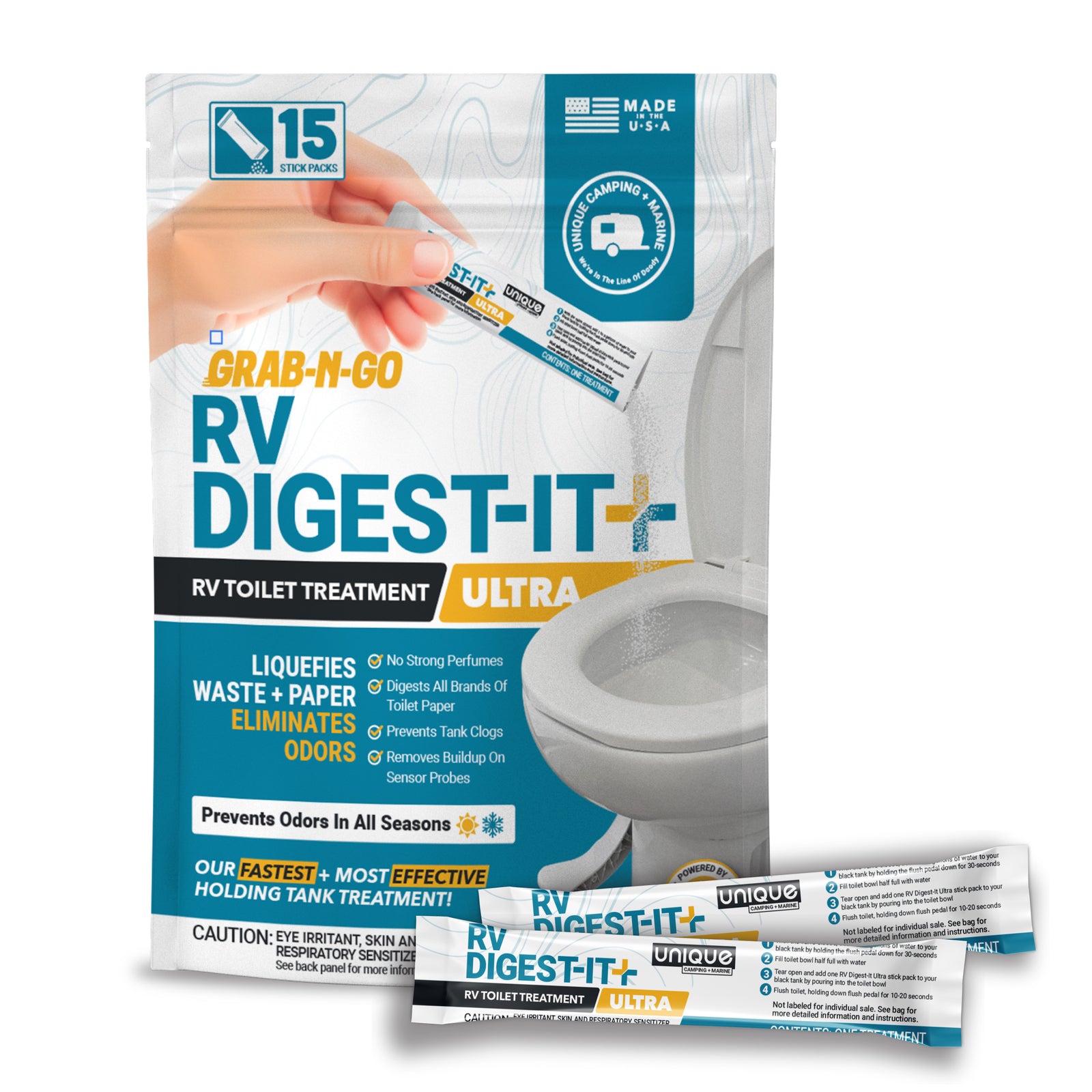
Prepping Your RV For Storage To Avoid Problems and Damage
August is here, and soon enough, kids are going to go back to school! Even though Labor Day is typically considered to be the end of RV season, for many RVers the start of school is really when they begin hanging up their RV keys for the season.
That means it’s time to start talking about prepping your RV for storage!
Most seasonal RVers know the importance of winterizing their RV to prevent freezing damage, but many don’t realize how important it is to prep your holding tanks BEFORE winterizing to make sure you don’t pull your RV out of storage next spring, only to discover a whole slew of stinky toilet troubles!
In this short post, we’re going to walk you through the steps you should take to ensure your tanks are spotless before winterizing and storing.
Before we get started, there are two different groups of RVers we’re considering in this post:
- Long Term - Those who winterize their RV and won’t touch it again until next spring
- Short Term - Those who will continue camping through the fall and winter months, but just intermittently
Note: For full timers, most of you are in warmer climates, and using your wastewater systems regularly, so nothing really changes for you!
Long Term Storage (Storing Your RV Until Spring)
Before you winterize your RV it’s important that your holding tanks are completely clean and empty. Left-behind waste that sits in a black tank over the winter months can harden and can create clogs and blockage problems. It can also lead to excessive odors in the spring, when you pull the RV out of storage, as well as significantly increasing your chances of misreading sensor probes.
Trust us, you don’t want to store your tanks with any waste in them! It will only make things harder for you in the spring, so doing your due diligence now will save you all kinds of headaches and problems down the road!
Black Tanks
Black tanks should be deep cleaned very thoroughly to remove any bits of solid waste and paper that may be leftover from a summer of camping fun. Doing this is easy.
Deep Cleaning Your RV Black Tank
- Dump and rinse your tanks. This is our preferred method for rinsing your black tanks.
- Fill your black tank with fresh, clean water.
- Pour one bottle of Unique Clean-It into the black tank, through the toilet.
- Let sit for 24 - 72 hours (no amount of time is too long though!)
- Dump your tank, and rinse well.
For all of the visual learners out there, this video will walk you through the steps of deep cleaning your black tank as well!
For long term storage, in climates where freezing is not a problem, you should store your black tank clean and empty.
If you live in a climate where freezing temperatures are possible, you should perform the above deep cleaning before you winterize your RV’s water systems and put it into storage.
Gray and Galley Tanks
Gray tanks and galley tanks should be deep cleaned as well to prevent any grease or debris from hardening inside the RV over the winter. Failing to deep clean your gray / galley tanks can lead to misreading sensors and tank odors in the spring. Again, a little work now will save you time and money next spring!
Deep Cleaning Your RV Gray Tanks and Galley Tanks
- Dump your gray or galley tanks.
- Fill your gray or galley tanks with fresh, clean water.
- Pour Dawn Ultra down your sink drain (Go crazy with this! More Dawn is always better. We typically tell people to stop glugging the Dawn down the drains when bubbles start to back up in the drain).
- Let this sit overnight.
- In the morning, dump your gray or galley tanks.
This video will show you how to clean your gray and galley tanks, as described above.
For long term storage you should store your gray tank clean and empty.
If you live in a climate where freezing temperatures are possible, you should winterize your RV’s water systems, including your gray and galley tanks, before storage.
Winterizing Your RV Water Systems
Many people opt to have their RVs professionally winterized by an RV tech as it provides peace of mind, knowing that their RV is safe from damage caused by freezing. There are many who winterize their RV themself, as well!
Whether you choose to winterize your RV yourself or have it professionally done is really a matter of personal preference. Keep in mind that some RVs are very simple and easy to winterize, while others have very complex water systems that are probably best suited for a professional winterizing.
For the DIYers out there, this article will shed some light on the process of winterizing an RV.
You can also watch this video where an RV tech goes through the process of winterizing a travel trailer. And this video where a larger fifth wheel gets winterized.
Short Term Storage (Occasional Use Of RV Over Winter Months)
Many RVers, especially those who use their RV as a winter getaway, will use the RV for several days or weeks, and then temporarily store them until they return. This type of camper is different from a full time RVer who lives in their RV.
These intermittent RVers should consider a few things when their RV is not in use:
Black Tanks
If your RV is going to go unused for periods of time, you should perform a few things to ensure you don’t return to find your tanks clogged or excessively stinky!
- Dump and rinse your black tanks before you put your RV into a dormant state
- Treat your tank with Unique Store-It while your RV is in a dormant state (for climates that aren’t prone to freezing).
Note: We recommend storing black tanks clean and full of fresh, clean water (only in locations where freezing isn’t possible!). Storing your black tank with water in it will ensure that left behind waste is kept soft so it can be easily removed with a good tank rinse (watch this video for our preferred method of rinsing your black tank) when you get back to your RV. Unique Store-It will take this even further by digesting any left-behind poop or paper, so your tank can be even more thoroughly cleaned when you get back!
Gray and Galley Tanks
If you plan to use your RV intermittently, where you will have your RV in short-term storage occasionally, we recommend the following for your gray and galley tanks:
- Deep clean your gray tanks before storing your RV. (See our steps for deep cleaning your gray tank above, or watch this video that walks you through the process of deep cleaning your gray tank with Dawn Ultra.)
- Store your gray and galley tanks empty.
Note: We recommend storing gray tanks empty when you aren’t using them. Here’s why: gray and galley tanks tend to accumulate grease that can cause sensors to misread if the grease coats the walls of the gray tank. If you store your gray or galley tanks with water in them this can cause the grease to float around the tank and get stuck on the sidewalls of the tank. By storing the tank empty, you prevent this from happening, so you can return to your RV and enjoy properly working sensor probes and water level monitors.
Conclusion
We hope this has helped you understand the importance of prepping your RV’s wastewater systems before storing your RV (either short or long term).
If you have any further questions, or if you need help with storing your RV, you can always contact our customer support team. We help people with storage questions all the time, and we’re happy to help you too!
Customer Support
support@uniquemm.com
866-662-4513

Prevent Common Problems In Your Tanks!
From misreading sensors, preventing clogs, or eliminating odors, we've got you covered no matter how you camp! All our best holding tank tips and trick information plus more can be found conveniently in one place when you download our FREE Unique Method Field Guide PDF. Achieve holding tank bliss today!
Get The Free Download Get The Free Download



